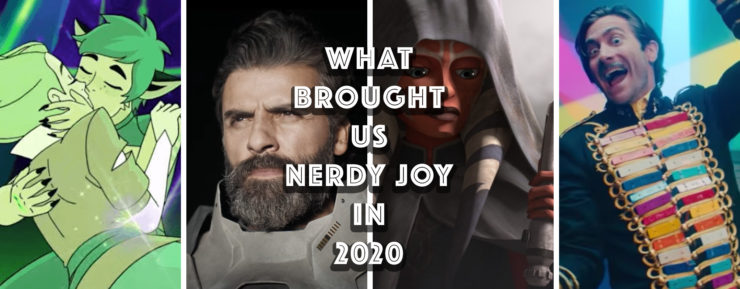Wow, 2020! Sure has been a…wait. It’s only been a year? And it’s not even over yet?? Are you serious???
This can’t be right.
Whatever. Sorry. We here at Tor.com have looked back through this terrible glacial age of a year, and found the nerdy moments that shone as diamonds in a sea of dross. Our joy came in unexpected ways—from celebrity sourdough starters to Oscar Isaac’s magnificent beard to rage-fueled Umbrella Academy members—but we were grateful for each precious drop of serotonin. Are we whistling in the dark? Possibly. But couldn’t it also be argued that, in times like this, we have more need than ever to find brightness, and life, and hope?
Some of us happen do that through geeky pop culture.
So please enjoy this list, and please tell us about your own moments of nerdy joy in the comments!
[Note: Some spoilers appear throughout the list.]
Avatar and Korra on Netflix
Listen—back in March, I was looking for Avatar: The Last Airbender, needing the show’s playful and low-trauma take on anticolonialism—only to find it disappeared on Nickelodeon’s home site. So it was with elation that I, along with the rest of the digital streaming world, got to reconnect with the Gaang this summer when the show came to Netflix. There was a beautiful combination of folks revisiting a childhood favorite, along with people discovering this show for the first time, all realizing what we know is the truth: Avatar: The Last Airbender is one of the best things television has ever done. Ever. Period. The show’s emotional found family narrative, careful political intrigue, and message of non-violent resistance came at just the perfect time. Top that off with the most perfect villain redemption arcs ever told, and you’ve got a joyful and hopeful viewing experience.
Of course, once our prayers for Aang were answered, the next prayers for the Netflix Gods were: Where’s Korra?? And lo, she appeared, with all her bulging-bicep bisexual haircut goodness, here to fight her own inner demons on top of worldly terrors. The Legend of Korra’s sophisticated narrative about self-discovery, healing from trauma, and the challenges of adult life is not only a natural progression to Aang’s story, but a necessary one. The two shows’ appearance on Netflix kept me afloat this year, and remind me that even the most capable hero needs a support system.
But also, let’s be real. It’s all about Appa. Appa is the thing that brought me joy this year. Appa forever.
–Christina Orlando
The Analysis of People’s Bookcases
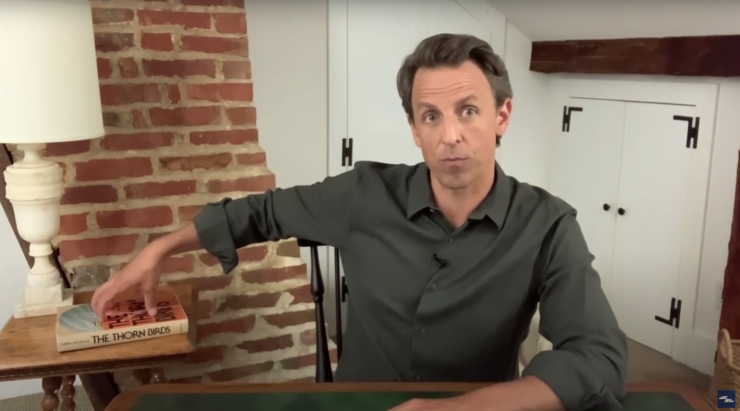
Immediately after Life Went Even More Online, a certain kind of beautiful nerd seized the opportunity to set their home offices up in front of their bookcases. Suddenly every Colbert episode featured multiple questions like, “What that’s book there behind you?” and pundits and actors alike were arranging their most impressive titles in eye-catching ways. Seth Meyers did the best with this, in my opinion, by creating a running gag around copies of The Thornbirds. All of my lovely colleagues dove into this, too, except me, because in this, as in all things, I am a HUGE JERK. I sit in front of the side of one of my bookcases. Anyone on a zoom or a hangout with me can see that there are, indeed, books behind me—but they can’t see which ones.
We’re all getting through this thing in our own ways.
–Leah Schnelbach
Video Games
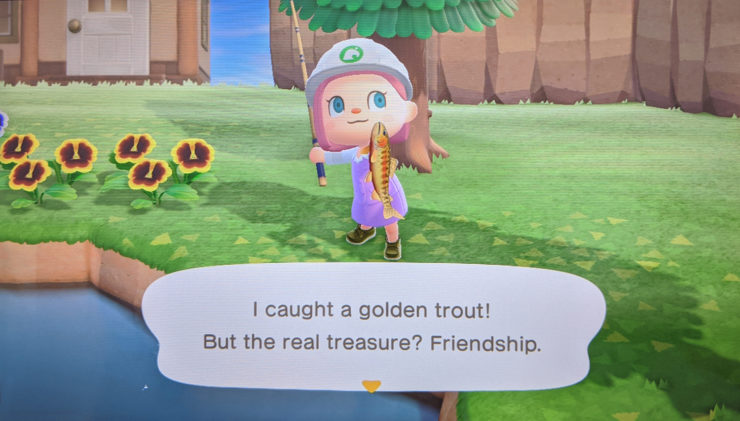
In early March I was debating whether I would bother with the new Animal Crossing game. If you’ve played one, you’ve essentially played them all, and I knew after about two months my virtual town would fall into disrepair. But then, well, you know. Soon I was building and re-building my little island, using it both to distract myself from the same-ness of my quarantine living space and to reach out to now-distant friends—excitedly texting when anything truly delightful occurred, gifting each other ridiculous outfits, and hosting in-game star-gazing parties. And yes, my island did eventually fall into disrepair over the summer, but it’s always there if I need it again.
I’ve buried myself in other games since Animal Crossing, each with their own brand of escapism. It was easy to get lost exploring the expansive pathways in Ori and the Will of the Wisps, with moments that could be deeply sad, but also beautiful (and only occasionally maddeningly frustrating). Fall Guys and Among Us provide quick doses of human interaction, and thankfully for me being “good” at either game is not necessarily a requirement for fun. And I am now eagerly awaiting the next Hyrule Warriors game, because I have the feeling that laying waste to hordes of moblins and lizalfos is going to be VERY therapeutic.
–Sarah Tolf
Doctor Who Retconned Over 50 Years of History for All the Right Reasons
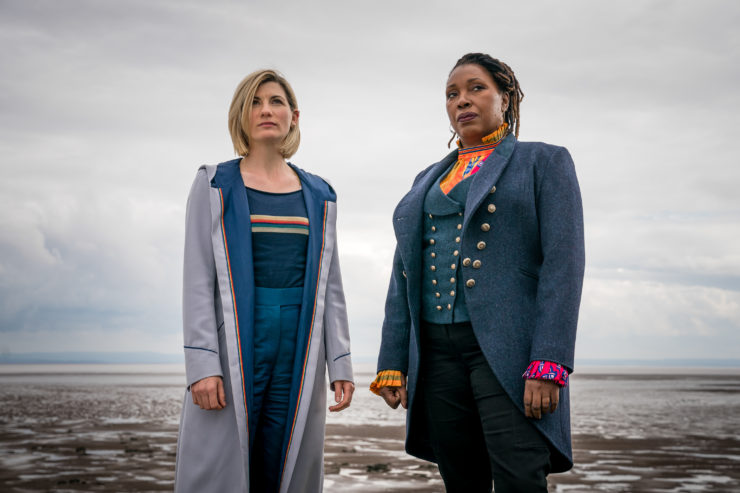
The new year started off right because Doctor Who came back and immediately gave us Sacha Dhawan as the Master. Honestly, that would have been enough for me all on its own—the relationship between the Doctor and the Master is well over half the reason I watch Doctor Who, which means that I’ve felt the character’s absence keenly since Missy’s departure in the Twelfth Doctor’s final episodes. Add the fact that Dhawan is phenomenal in the role (and that the character’s “disguise” this time around was particularly arresting), and you’ve already got the recipe for a fantastic season. Then they brought back Captain Jack Harkness, to sweeten the deal.
And then the show offered up an expected gift to fans, making good on a suggestion that has played throughout the show’s history: the idea that there have been previous incarnations of the character, before the versions we have seen. This was done by reconsidering Time Lord history, making it clear that the ability to regenerate was something that was grafted onto their species… taken from a child who later became the Doctor. This not only cemented the general awfulness of the Time Lords (they’ve always been pretty terrible), and created an entire pantheon of Doctors who we’ve never met before, but further cemented Jodie Whitaker’s place as the Doctor. Unsurprisingly, a small but vocal contingent online took exception to the mere concept of a woman playing the part, but this retcon to the mythology not only makes it clear that women have always been the Doctor—it makes it clear that the Doctor was a woman (of color!) first. That is massive. That is incalculable in the difference it makes to all people who adore this show, and waited so long to see more representation in the role. Anyone can be the Doctor.
—Emmet Asher-Perrin
Margo’s Last Smile in The Magicians’ Series Finale
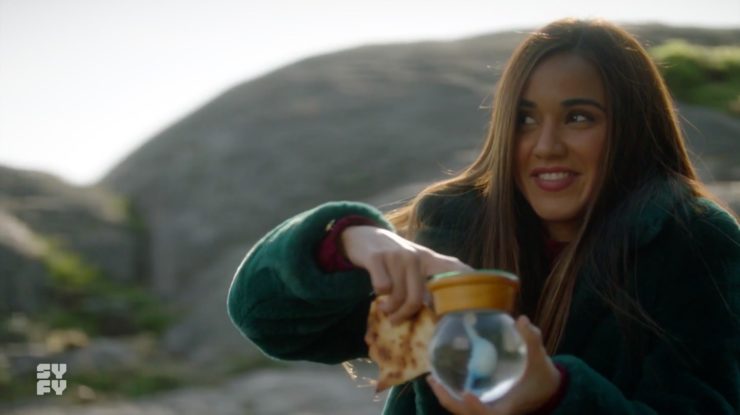
At this point, I’ve made my love for The Magicians pretty well known. But when I wrote about the series ending, I didn’t write about the specific moment it all ends. And it ends with Margo (Summer Bishil) pushing a tiny, incredibly meaningful button, a gleeful, mischievous smile on her face. Click.
They’ve all been through so much, but Margo, by the end of “Fillory and Further,” has offered to sacrifice herself for the country she’d ruled (and been deposed from). She’s in a different world from her beloved Eliot, though at least this new, not-Fillory world has fields of bacon and pizza trees. She started out all cutting remarks and hilarious defensiveness, but she’s grown beyond the title Eliot gave her, way back when: High Queen Margo, the Destroyer. She’s now High Queen Margo, the Creator—and a woman with the confidence and experience to know that she and her friends will get through this, too.
Sorry, where are the tissues, and also the remote? I need to watch this episode again.
–Molly Templeton
Hannibal on Netflix
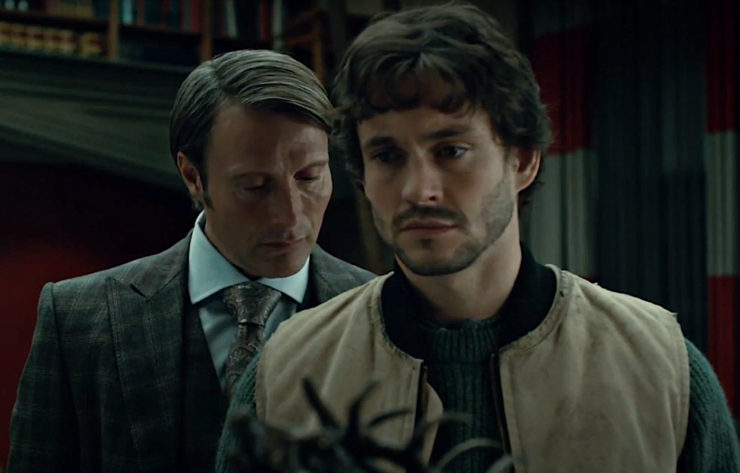
Hannibal came to Netflix, and for a glorious week it was in their Top Ten, but even apart from sheer viewing numbers, the move to Netflix soon after quarantine meant that a lot of people who had been meaning to watch the show finally settled in for a marathon, and the numbers of Fannibals swelled like a dead horse’s stomach after you’ve stuffed it with a social worker. Thinkpieces were written or re-run, TV critics got a chance to yell about how amazing the show is, there was a virtual reunion, and Bryan Fuller popped up on a bunch of panels and podcasts to tell us all about the importance of horror. I’d love it if all this resulted in more seasons for the show, so Fuller could finally give us his full vision, but even if that never happens, it’s been wonderful watching the meadows of flower crowns grow.
–Leah
Oscar Isaac’s Dune Beard
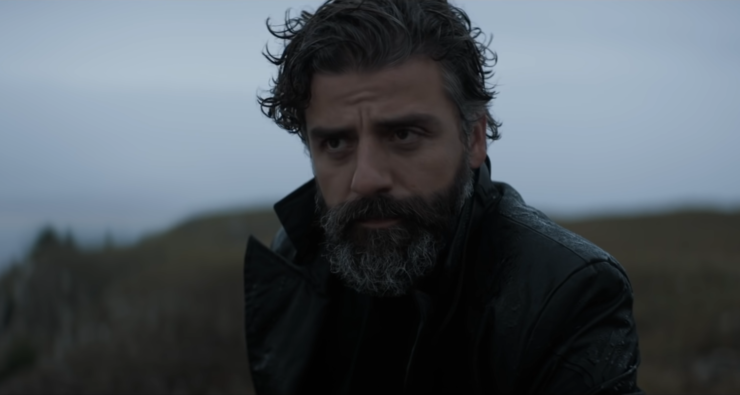
I mean……………… are you fucking kidding me???? Space Papi.
–Christina
The Great British Bake-Off: Pandemic Edition
I had no idea this was happening until the first episode appeared in the U.S. on Netflix, and it instantly put a giant grin on my face. This show is always a joy—a reality show competition free from the usual manufactured drama of the genre. In previous seasons, contestants traveled each week for the show, practicing some of the bakes at home in between tapings. But in light of the pandemic, production was forced to adapt, isolating the cast and crew together for 6 weeks. The result seems to be an even more familial bond between the contestants, hosts, and judges, and it is as wonderful to watch as ever. But lest things get too sappy, the show is also a glorious testament to human folly: the first episode ends with a challenge to create cake-busts—including overly ambitious attempts to embody Freddie Mercury, Charles Darwin, and Lupita Nyong’o—and nearly all of them are wonderfully disastrous…
–Sarah
Catradora Came True
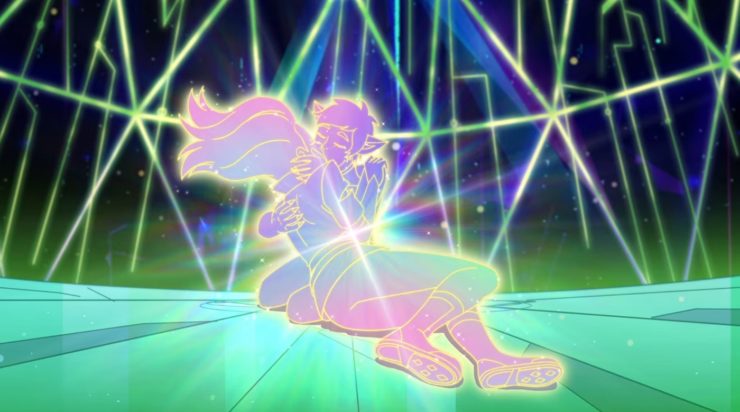
For the longest time, queer representation was rarely found in media except as a fuel for tragic storylines. In more recent years, fans became acquainted with the concept of “queerbaiting”, where a piece of media would make it seem as though characters might reveal themselves to be queer and fall in love, but never make good on the suggestion. So when She-Ra and the Princesses of Power dropped its first season, and introduced fans to Adora and Catra—who seemed primed for a friends-to-enemies-to-lovers storyline—I held my breath and didn’t bother hoping too hard. There are a lot of reasons these things don’t follow through, and often they’re caught up at the corporate level of things. It wouldn’t do to set myself up for disappointment.
But when She-Ra ended, those fears turned out to be unfounded in the most beautiful way. Not only did Adora and Catra turn out to be the endgame of the show, but the finale of the series was blatantly pro-love, pro-acceptance, and pro-queerness. Adora and Catra confessing feelings for one another wasn’t just a sweet button on the action-packed ending—their love saves the universe. Full stop. It was such a precious gift to receive halfway through this arduous year. I couldn’t stop talking about it, and there were plenty of eloquent, insightful people who felt the same. Since its release, fans have been campaigning for the show to get a movie, another season, any sort of continuation. I’m not sure that sort of thing is in the cards, but we got this. No one can take it from us.
—Emmet
John Mulaney and the Sack Lunch Bunch Brought New York Into My Home
Look, I’d already had a shit couple of years before COVID even hit my city. I watched John Mulaney and the Sack Lunch Bunch when it premiered on December 24th, 2019, and it gave me a sweet, sweet serotonin hit that has only become more important to my mental health as months??? years???? decades????? time has rolled on. But it took me a few months to figure out why.
Mulaney wasn’t born in New York, he moved here, and it seems to me, is a New York convert. I am also a New York convert. It’s become popular over the last year to either say the New York is dead (it’s not!) or to smirk and say “New York doesn’t care about you”—but this has not been my experience. New York has never failed me yet. Horrible things have been done to me here, sure, but far worse were done in Florida and Texas. It’s too expensive, it’s difficult to live here, “making it” in New York doesn’t really mean anything. But that isn’t the point for me. My years here have felt like one long trust fall, and this city has always, always caught me. On the best days it feels like I live inside a sentient organism, like I’m a tiny seahorse in dad’s pouch.
This is part of why Sack Lunch Bunch has been such a source of comfort this year. It isn’t really about New York, but it’s infused with a particular New York tone in the same way that early Sesame Street is, and there are certain moments and sketches that could only happen here. I am not exactly a “lady”, but I have been The White Lady Standing on a Street Corner Just Sobbing. Nor (despite my deep love of The Jerk), was I born a small Black child, and yet I have also been Alexander Bello, wondering what it would take to walk over to a person crying and become their friend. There was a point, in July I think? When I realized that the only time I had heard “stand clear of the closing doors please” since MARCH was as a sound cue in this special. It’s been months since I passed Fran Leibowitz in the street, or grabbed an egg and cheese from a bodega, or mentally cursed some idiot for stopping in the middle of the sidewalk, or rolled my eyes at a guy trying to get me to come to a comedy show. But it isn’t even just the way JM&TSLB makes me feel like I’m still part of my city: this show is resolutely on the side of the children, it reminds you to pay attention to life while you have it, it gives you a space to face fear, it’s a celebration of creativity and invention unencumbered by commercial concerns. And that’s all before we get to the chaos angel that is Jake Gyllenhaal playing the chaos demon that is Mr. Music.
There is music everywhere, Schmendrick. If only you have ears to hear.
–Leah
Stephen Colbert Meets Jake Gyllenhaal’s Sourdough Starter
Speaking of Jake Gyllenhaal, this moment is the greatest commentary on That Time A Bunch Of Us Made Sourdough Bread.
–Leah
Murderbot
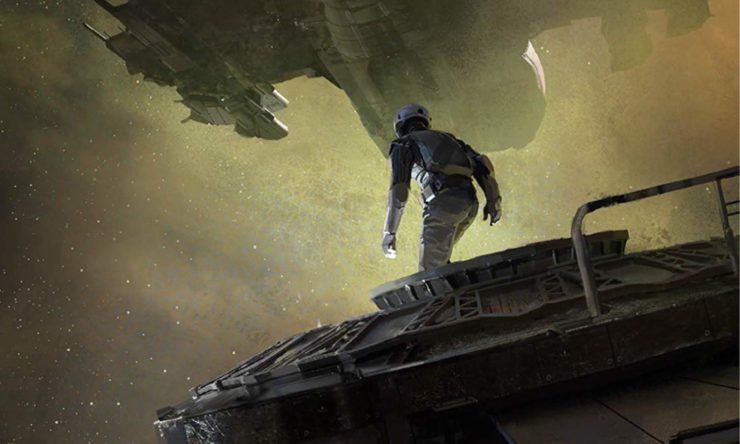
When I’m stressed I generally turn to TV to unwind, whether it’s revisiting old friends in Parks & Rec, or relishing the soap-y drama of Riverdale, or trying to parse just how seriously all these American Gladiator-style shows are actually taking themselves (Ultimate Tag, anyone?). Which is maybe why it’s so easy to relate to the main character of Martha Wells’ Murderbot Diaries, who would rather watch its cache of shows then, well, do just about anything. I finally caught up with the book series this year, and for me one of the biggest appeals is the consistent, if sometimes buried, sense of optimism. Despite the looming threat of corporate and political forces, despite the numerous action scenes featuring actual murderous robots, the series is constantly centered on people (and robots, and A.I. constructs) defined by kindness and caring. As much as Murderbot complains about how useless and terrible humans are (and we are), it always meets at least few that are worth the trouble. And right now, I could use that kind of comfort-read.
–Sarah
John Boyega Talking About How Finn Was Handled in the New Star Wars Trilogy
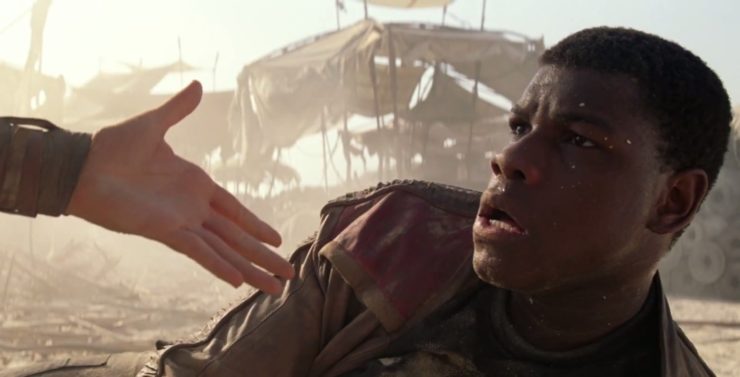
In a profession that frequently chews people up with little remorse, John Boyega appears to have had enough. This year has seen superstar be more candid than ever about how he’s been treated, even in his success as an actor. Boyega gave an interview with GQ Magazine where he got frank about the past several years of his career, how he almost overworked himself right out of it, and how he felt about the end of Finn’s arc in latest Star Wars trilogy, starting with “what I would say to Disney is do not bring out a black character, market them to be much more important in the franchise than they are and then have them pushed to the side. It’s not good. I’ll say it straight up.”
It was powerful to see him call out the mega-corp for making those decisions around his character, and while it’s disheartening that he had to do it in the first place, it’s still something that the world needed to hear. Disney did wrong by Finn, who was heavily featured in the ad campaigns for The Force Awakens as the guy hefting a lightsaber… only to have that handy piece of marketing used as a smokescreen to hide the true central Jedi of the trilogy, Rey. While Rise of Skywalker made a suggestion that Finn was Force-sensitive, it refused to center that arc in the trilogy’s narrative. In fact, it refused to center the narrative of any of its POC cast, focusing primarily on Rey and Ben Solo’s redemption. Boyega pointedly did not blame director JJ Abrams for this (which many fans did when the film came out), placing the responsibility at Disney’s feet: “So what do you want me to say? What they want you to say is, ‘I enjoyed being a part of it. It was a great experience…’ Nah, nah, nah. I’ll take that deal when it’s a great experience. They gave all the nuance to Adam Driver, all the nuance to Daisy Ridley. Let’s be honest. Daisy knows this. Adam knows this. Everybody knows. I’m not exposing anything.”
He’s right. Everybody knows, but no one feels like they can say so without risking their stability or future—until someone decides they’ve had enough. And in that regard, we could all stand to learn a little from John Boyega.
—Emmet
Billie and Thea in Bill and Ted Face the Music
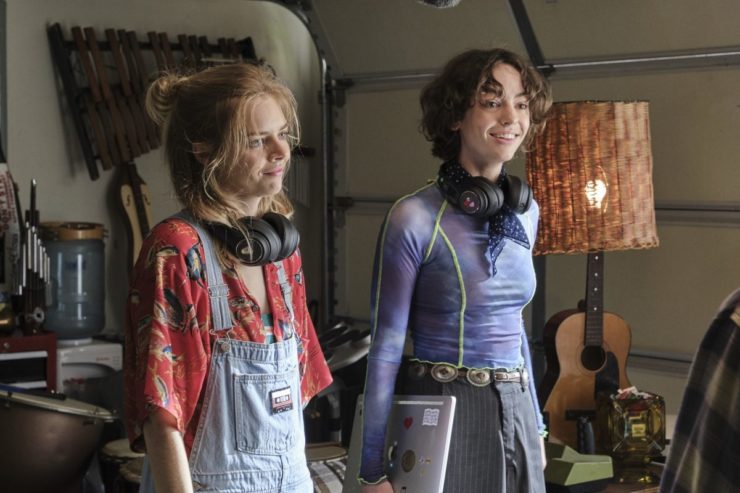
One of the most unexpected highlights of 2020 was the return of Bill and Ted in Bill and Ted Face the Music, in which a middle-aged Bill & Ted try to finally write the song that will bring harmony to the universe. The movie was unexpected both in the sense that (a) after all the talk of making a third film, I don’t think anyone really expected it to happen, and (b) rather than being an easy nostalgia grab, the film turned out to be GREAT. But the best part of all was the introduction of Bill & Ted’s daughters, Thea and Billie. The younger B & T are open and enthusiastic about their dads’ musical experimentation, and totally willing to hop into a time machine and collect musicians to help with the world-saving song. But here’s the best bit: they are both completely defined by their love of music. They’re never damsels in need of rescue. They both wear outfits that are cool without being particularly gender-y. They’re two young gorgeous people going backstage at historical concerts, but they’re never sexualized in any way. They’re there for the music, they are open to every possible genre, and each artist in turn recognizes their enthusiasm and treats them as part of a family.
–Leah
Ahsoka Tano at the End of The Clone Wars
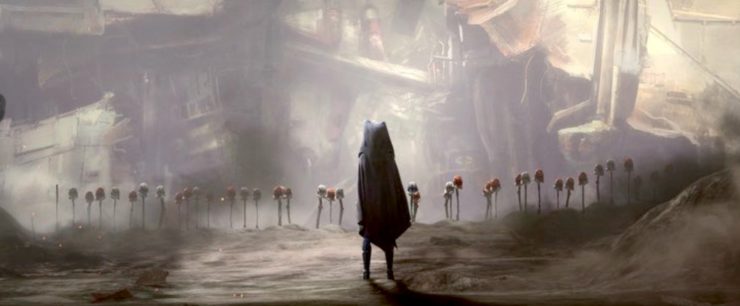
Ok, so “joy” might not be the right word for a wrenching scene that broke my heart into a thousand pieces (it’s ok; the droids will piece it back together). But as heartbreaking as the end of The Clone Wars is, it—and Rebels—reinvigorated my love for Star Wars this year, and that’s a truly joyful feeling.
As soon as it becomes clear that we’re going to see Order 66 from a new perspective, you know where this last story arc is going: Ahsoka is going to have to defend herself against the clones she’s grown to know and love over the years of her training. Clones who have painted their helmets to match her facial markings. Clones who respect her even when the Jedi Council wants to dismiss her as a civilian. And above all, Rex, who fights his programming so very, very hard.
There are plenty of battles in SFF that involve friends fighting friends, but this one is gut-punch after gut-punch as Ahsoka tries not to hurt the clones, tries to do everything she can to save them all—and for the most part, fails. The ending is dark, and heavy, and thick with all the emotional weight the prequels didn’t have. For many people, the last shot of Darth Vader’s reflection is the killer. For me, it’s Ahsoka, standing in front of all those helmets. They were all betrayed by the institutions they trusted. The Rebellion begins so many times, but this is the moment I will always think of as the spark.
–Molly
Five Hargreeves Goes on a Murder Spree
Look, I’ve got a pretty damn dark sense of humor. And while I understand that said sense of humor won’t always play to other people, it makes me feel better? Especially when things are significantly stressful? Which also meant that I was particularly relieved that The Umbrella Academy was going to air its second season this year because that shows sensibilities when it comes to aesthetics, lack of logic, and humor runs pretty parallel to mine. (Plus, those song choices.) And there’s a whole plot line in said season where Five Hargreeves (spoiler alert) is cornered into murdering the Commission’s Board of Directors on behalf of the Handler in exchange for getting his family back to their proper point in the timeline.
Said murder-mission takes place in Oshkosh, Wisconsin where the board has met under the guise of a soybean convention (ah, the midwest). Before taking up an emergency axe to get the job done, Five has a fight with a vending machine that refuses to bequeath a Fudgenutter bar. After breaking said machine with no resolution to his sugar problem, he ends swiping a bunch of frosting off of a nearby cake instead. Then he cheerfully butchers a room full of people to the tune of “Polk Salad Annie”. The fallout is admittedly less chipper than the preceding death and mayhem because Five has got some significant angst over being so adept at murder—he immediately turns around and tells the Handler that he’s not going to kill anymore, which she finds adorable.
Is it kinda screwy that I found said murder spree joy-making? Probably. But sometimes your brain makes things into metaphors, and the idea of gleefully hacking apart everything that has made this year unbearable (“I’m not doing this for money,” he tells AJ, when the fish makes the mistake of offering to pay him off) clicked into place fiercely for me. It didn’t make Five feel better, but I was entirely comforted.
And now, click here for a brilliant edit where all of his spacial jumps have their sound effect replaced by the Horrible Goose honk. You’re welcome.
—Emmet
John Boyega Speaking at a Black Lives Matter Protest
This summer was…. not easy for Black folks. The murder of George Floyd by the Minneapolis police was just one in a series of unjust killings of Black people, including David McAtee, Breonna Taylor, Tony McDade, Ahmaud Arbery, Oluwatoyin Salau, and Dion Johnson, that sparked massive protests across the world this summer. While the murderers of these individuals face little to no consequences, caring humans rose up to continue making it known that this cannot stand, calling for justice, for changes to policing and prison systems, for understanding, for equity. Black Lives Matter. Black Trans Lives Matter. Enough is enough.
The protests saw many celebrity faces, including Pedro Pascal and Ariana Grande, but John Boyega’s passionate speech in London was a significant moment. Boyega has been outspoken about the mistreatment of actors of color by Disney and the Star Wars franchise, as well as about racism both in the entertainment industry and beyond, so it was no surprise that he had some words on that day. While the speech was unplanned, his words ricocheted across the world: “Black lives have always mattered, we have always been important, we have always met suffering, we have always succeeded, regardless. And now is the time. I ain’t waiting. I ain’t waiting.”
Now, this isn’t really joyful. It’s incredibly heartbreaking and hard to watch. But as we continue, even now, to take to the streets to demand justice for Black people in this country, Boyega’s words ring in my ears. We’re not waiting.
–Christina










